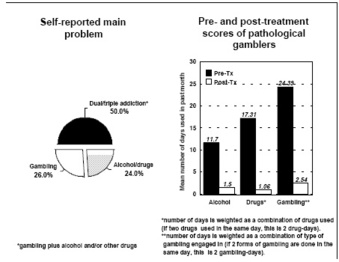Individuals with disordered gambling often struggle with other addictive behaviors, such as tobacco and alcohol dependence. In addition, some patients who recover from a gambling problem substitute intoxicant use for their previous gambling activity. Similarly, some individuals who no longer abuse substances begin to gamble. The interconnections between substance abuse and pathological gambling are not often addressed in treatment settings that focus exclusively on one addiction. The South Oaks Hospital in New York offers an addictions program that treats alcoholism, chemical dependency, and compulsive gambling. Clinicians screen patients admitted for one of these three problems for the presence of the other two, and provide treatment for all addictions simultaneously. The treatment program includes individual and group psychotherapy, psychodrama, patient education (e.g., films, lectures), 12-step groups, and aftercare. Researchers examined treatment outcomes of 72 primarily white, male pathological gamblers who also had been screened for alcoholism and chemical dependency. While these 72 patients met SOGS criteria for pathological gambling, only 26% reported gambling to be their main problem. Half of the patients reported dual or triple addictions (gambling and alcohol and/or drugs) to be their main problem, while 24% considered alcohol or drugs to be their primary problem. Regardless of which addiction patients considered primary, treatment was effective in significantly reducing the number of days in the past month that patients engaged in substance use or gambling. Similarly, Addiction Severity Index scores significantly declined in the areas of alcohol, drugs, and gambling. Post-treatment interviews were conducted between 6 and 14 months after the initial interview. These results imply that treating pathological gamblers in settings that address more than one addiction can be effective in bringing about short-term change. Vaillant’s research has shown that while short-term outcomes may imply successful treatment, it is important to consider long-term outcomes to truly assess the effectiveness of any treatment**.
Sources:
*Lesieur, H.R., Blume, S.B. (1991). Evaluation of patients treated for pathological gambling in a combined alcohol, substance abuse and pathological gambling treatment unit using the Addiction Severity Index. British Journal of Addiction, 86, 1017-1028.
**Vaillant, G.E. (1997, March). What makes treatment work: A longitudinal perspective. Paper presented at The Cambridge Hospital Department of Psychiatry’s The Addictions: What Works conference.
This public education project is funded, in part, by The Andrews Foundation.





